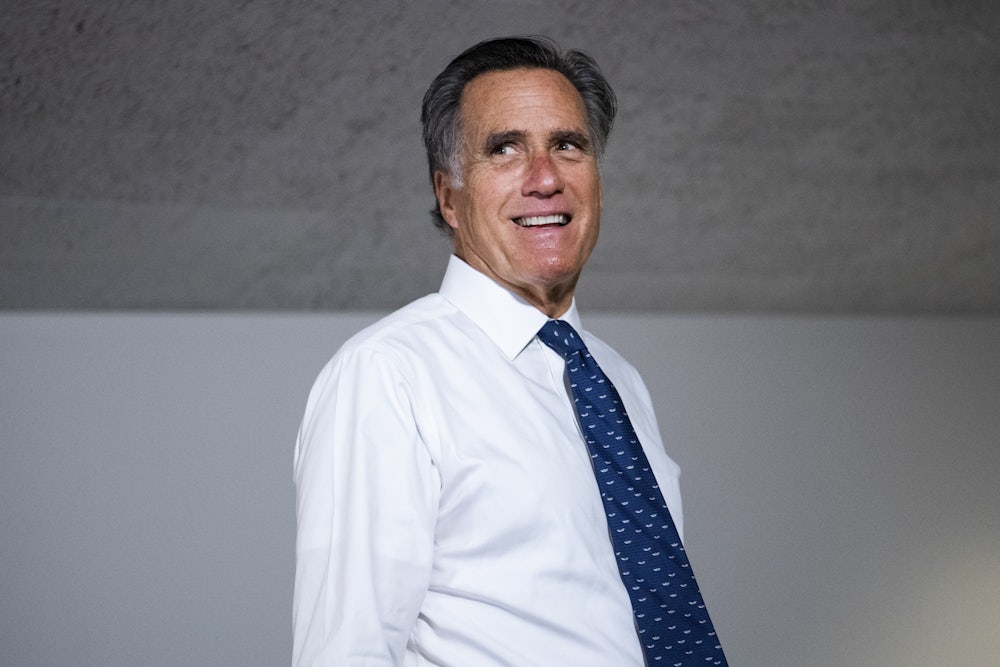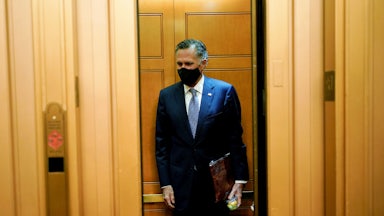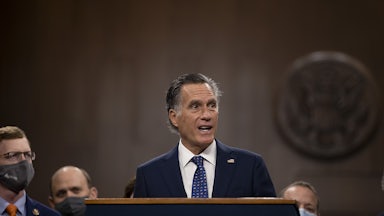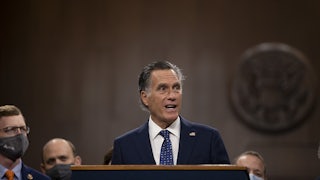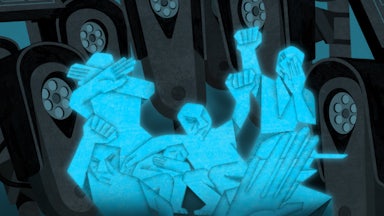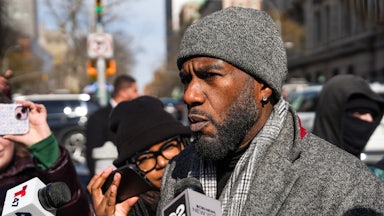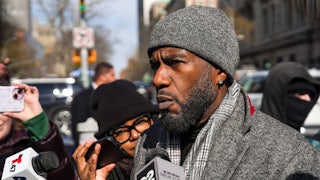In at least one sense, there’s nothing truly objectionable with the premise of “America Is in Denial,” Mitt Romney’s latest column for The Atlantic. As the Republican senator and former GOP presidential nominee fairly argues, Americans are, in many ways, trapped in a state of denial about the state of the country.
It’s hard to think of a more bitter reminder of that than this weekend, when the country celebrated its 246th year of independence amid mass shootings, soaring temperatures, and skyrocketing inflation. Congress has in recent months only really been able to muster a milquetoast gun-control bill that does little to address the root causes of gun violence. The Supreme Court, meanwhile, has just robbed women of bodily autonomy, discarded a ton of prior precedents like a demented Marie Kondo, and seems more likely than not to take a fateful step into overthrowing our current electoral system and installing permanent minority rule. The Republican Party, meanwhile, grows more authoritarian by the week; while the House holds hearings proving beyond any measurable doubt that Donald Trump spent months working on a coup with his inner circle, he nevertheless remains—by a considerable margin—the GOP’s likely nominee in 2024. The country is clearly broken and beset by existential threats. What is there to be done?
Romney, to his credit, addresses some of these matters. There is no mention of gun violence—though the absence of any reference to Monday’s shootings in Highland Park, Illinois, and Philadelphia are a fluke of timing, there were numerous previous examples that might have been brought up—or the Supreme Court. He does, however, mention the looming threat of droughts and rising temperatures; he also notes that “the return of Donald Trump would feed the sickness, probably rendering it incurable.”
But the Utah senator’s premise—that America itself is in denial—is a revealing bit of projection. Romney isn’t actually interested in scrutinizing the way in which many of his numbered ills came to be emergencies. Instead, he’s up to something more akin to sleight of hand. Romney has cast himself as a square-jawed Cassandra, here to tell harsh but necessary truths about the delusions of the right and left—which are, naturally, on equal footing. His solution? It’s something along the lines of, “Please, please, please let me get what I want.” Romney might have done better to include himself in his core diagnosis: The signs of his own deep denial shine brightly in his prose.
His analysis of the left is a particularly revealing example. While it’s certainly the case that various individual politicians have been grave disappointments—and the collective desire of many Democratic senators to put the preservation of the filibuster ahead of all other considerations has harmed the cause—to say that the left, writ large, is in denial over the needs of either our planet or our democracy is a claim that cannot be substantiated. Democratic politics—across the spectrum—have featured a heavy focus on existential warnings about the health of the planet and the republic for most of the last seven years. To make his counterclaim, Romney has to focus his attention on two narrower priorities: undocumented immigrants and the economy, particularly the national debt.
On the question of undocumented immigration, Romney accuses liberals and the left of hiding their heads in the sand. “When TV news outlets broadcast video after video of people illegally crossing the nation’s southern border, many of us change the channel,” he writes. But Romney conveniently ignores the fact that it’s rampant nativism on the Republican side that has both driven the constant televised fearmongering of the forever-on-the-march caravans of asylum-seekers, and which has blocked immigration deals in the past. Immigration reform bills have been met with the same resistance on the same grounds—any pathway to citizenship is immediately denounced as amnesty, even when it’s included in deals with huge increases in “border security” measures, as happened most famously in 2014. The resistance is also coming from the same quarters: Republicans, who will accept nothing short of a totally closed border, along with drastic restrictions on legal immigration. What Democrats are supposed to do about the GOP’s intractable position is anyone’s guess.
On the economy, Romney is even more emphatic. Democratic spending is causing inflation to skyrocket: “As inflation mounts and the national debt balloons, progressive politicians vote for ever more spending,” he writes. Setting aside the fact that the causes of the current spike in inflation remain cloudy—and that corporate greed and supply chain disruptions have likely played as much of a role as pandemic spending—Romney is, once again, being willfully dishonest.
For example, at no point does Romney call for a repeal of the Trump tax cuts that he voted for in 2017, which touched off a frenzy of stock buybacks while offering little more to the general public beyond exacerbating income inequality. He doesn’t call for any tax increases at all, in fact. This is an especially odd hole that Romney has dug for himself inside the space of a few sentences: In one hand, he extends an olive branch to the left in the form of acknowledging the reality of climate change. In the other, he withholds the means to address the reality to which he’s just admitted—surely addressing the crisis will have to involve rather robust spending increases and a shift in economic priorities. Whether or not those are part of something like the Green New Deal—which Romney vehemently opposes (he referred to it in 2019 as “silliness”)—is never mentioned. Nor does Romney fill the space with some new idea. Instead, by invoking the national debt as the root cause of our problems, Romney essentially implies that he has an older idea in mind: austerity, most likely in the form of cuts to earned-benefit programs such as Medicare and Social Security—a longtime GOP dream.
If Romney were willing to be honest, there is a more interesting essay hiding in plain sight. Romney writes about a national delusion as if he alone is immune from it. But in 2012, he ran a presidential campaign in which he called on undocumented immigrants to “self-deport” while pitching himself to rabid Republican voters as a “severely conservative” governor. It is almost as if he recognized the need for illiberal extremism to get ahead in his own party.
During that same campaign, when it had already been abundantly established that climate change was driven by human activity, Romney told donors at a closed-door event, “My view is that we don’t know what’s causing climate change on this planet, and the idea of spending trillions and trillions of dollars to try and reduce CO2 emissions is not the right course for us.” More recently, he has compared Democrats’ efforts to push for a voting rights bill—which has only become a direr necessity because of the GOP’s ongoing effort to pass voter-suppression laws across the country—to Donald Trump’s efforts to literally steal the 2020 election.
Whatever character Romney is demonstrating now still leaves substantial debt in his ledger; he has done little of consequence to address the crisis in any meaningful fashion beyond this essay. Romney is one of only a handful of people with direct, intimate experience of pushing the delusional claims of climate denial on voters. He knows what the incentives are and why they persist because in his own desperate attempt to win the White House, he aligned himself in this direction. Romney could be honest about how things work, but rather than do that, he spends the back half of his essay summoning the force of historical figures— Lincoln and Reagan, Churchill and Martin Luther King, Lech Wałęsa and Volodymyr Zelenskiy—to show his readers “what real character looks like.” A reasonable rhetorical move, given that the name “Romney” is insufficient to the task.
At bottom, this is just another wan, pleading attempt to assert the existence of “reasonable” Republicans. Romney detests Donald Trump’s tone, but he loves his Supreme Court appointees. He thinks Joe Biden is a decent guy but also a total failure. What he wants is for some “normal Republican” to arrive on the scene: someone who might acknowledge that the climate is warming but won’t do much about it. Someone who will cut taxes for corporations and slash social spending. Someone who will court the Republican far right on immigration policy and then blame the failure of immigration reform on Democrats. Someone like Mitt Romney.
